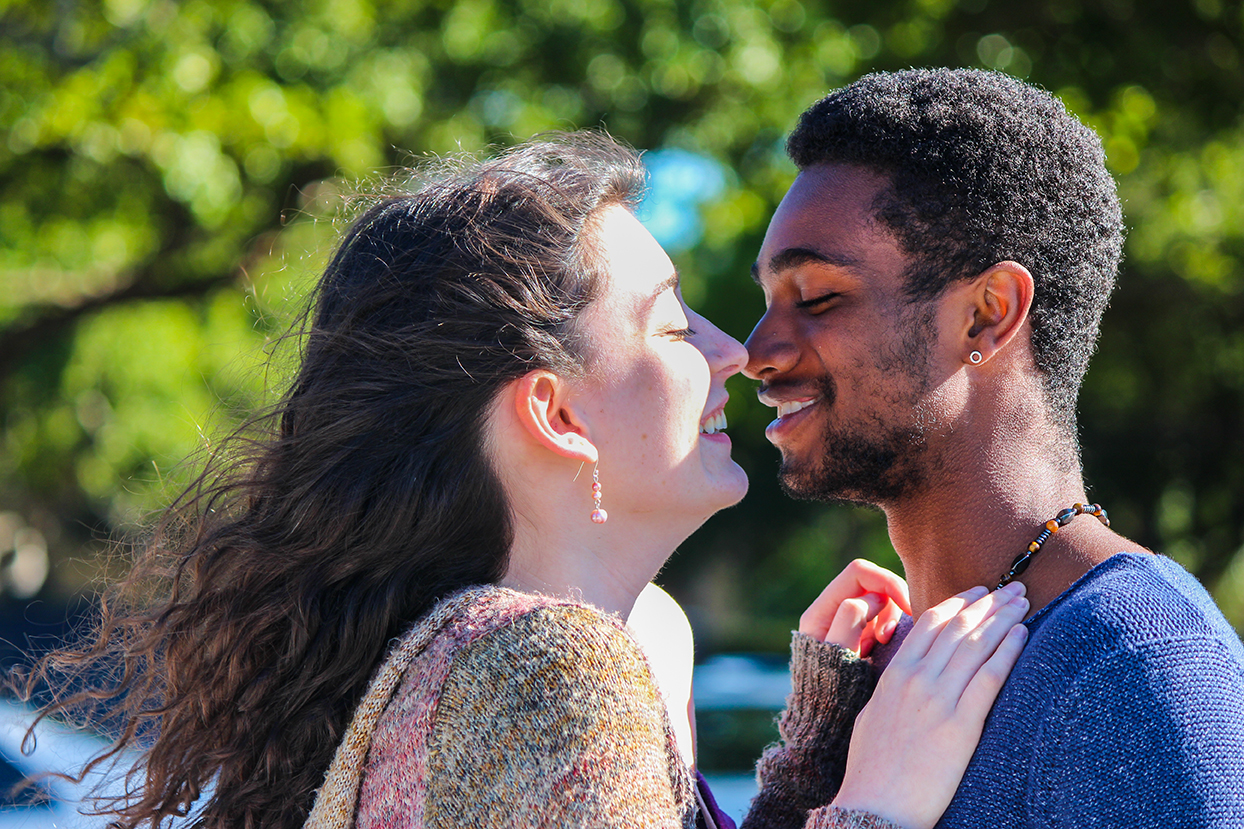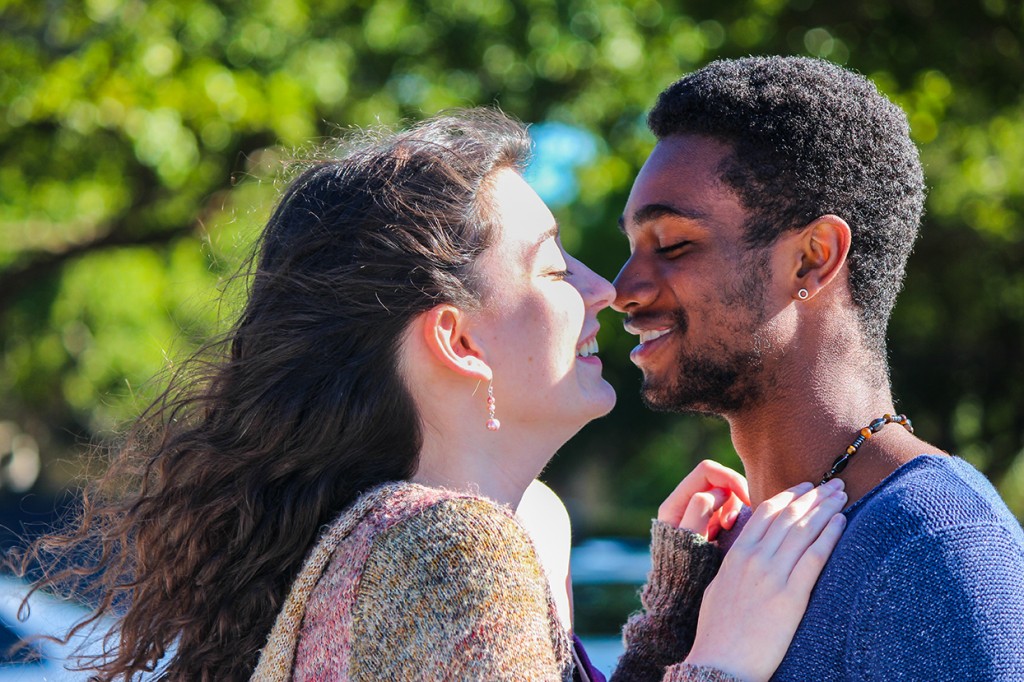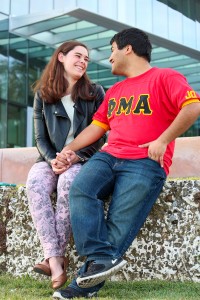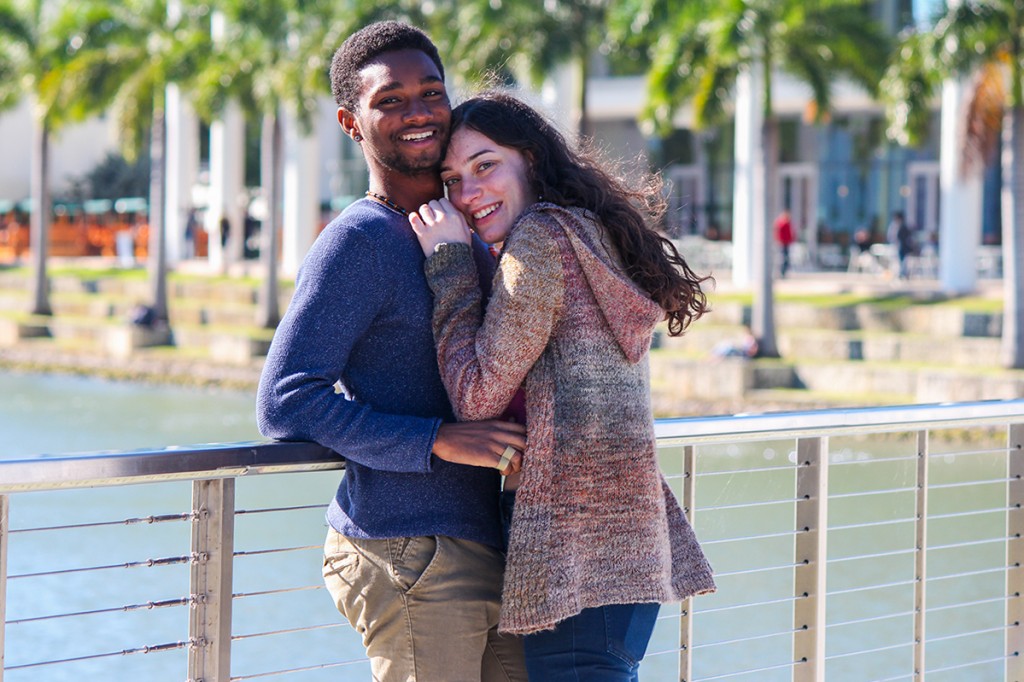

Although supportive, junior Bernie Degnan’s parents question their son’s relationship with his girlfriend, sophomore Ambar Jivraj, since he is Jewish and she is an actively practicing Muslim.
“When I tell my mom that Ambar goes to her place of worship almost every day, my mom is like, ‘Oh, if they’re really religious, why are they okay with you being Jewish?’” Degnan said.
But Degnan and Jivraj don’t see their different backgrounds as hurdles in their relationship. In fact, having grown up in diverse environments, they don’t consider it out of the ordinary.
“We don’t think dating interculturally is a big deal at all,” Jivraj said.
According to a Pew Research Center (Pew) study of the four generations spanning from 1920 to 2014, millennials are the most diverse, with 57 percent identifying as white, 21 percent Hispanic, 13 percent black, 6 percent Asian and 3 percent listed as other.
In another study, Pew found that millennials are also the most accepting of interracial dating.
The Miami Hurricane conducted an online survey to explore intercultural dating on campus and received 50 responses. Forty-eight percent of respondents in a relationship were dating someone of a different race. Among those not in a relationship, 66 percent of respondents said they are likely or very likely to date someone of a different race, religion or culture.
FAMILY
While Degnan and Jivraj see their relationship as normal, their parents are still becoming comfortable with it.
“This is probably more of an awakening for my mom,” Degnan said.
“It’s probably more educational for our families than for each other,” Jivraj agreed. “I guess the older generations have more stereotypes. I feel like our generation is more open to things.”
Neither the parents of Jivraj nor Degnan have actively encouraged their children to date within their religion, but Jivraj said they might have an underlying preference for it.
“My parents are religious and Bernie’s mom is religious,” Jivraj said. “So like with any family, if you’re dating someone outside your religion, it’s like they’d want you to date someone in the religion … whether you’re Christian or Muslim or Jewish.”
Unlike Jivraj and Degnan’s families, the parents of African-American sophomore Alex Michell have suggested that he date girls of the same race. However, they never pressured him, and he has now been dating sophomore Emma Freeman, who is white and Jewish, for over a year.
“I remember if I was ever talking to my parents about being interested in any white girls, they would be like, ‘Why don’t you find any of the black girls at your school pretty?’” Michell said. “So nothing big, but they were curious.”
Similarly, Afro-Cuban freshman Alana Requejo said her mother has expressed an interest in her dating African Americans, although she has always been open to dating anyone.
“My mother is African American, so she always wanted me to be with someone that’s African American. She’s always wanted me to have a black husband,” she said. “But I find everyone cute.”

RELIGION
In TMH’s survey, 64 percent of respondents said they were dating someone of a different religion, and 73 percent of single respondents said they would consider dating someone of a different religion.
While Requejo practices Santeria, a religion involving belief in spirits and the worship of saints, her Dominican boyfriend, Ian Ortiz, practices Christianity. At the beginning of the relationship, Requejo said she was nervous about their religious differences.
“Initially, I was kind of afraid to tell him about the Santeria, because usually when people hear that, they’re like, ‘What are you talking about? That’s weird, isn’t that Voodoo?’” she said.
But according to Requejo, Ortiz was “very open-minded about it,” helping her become more candid about her religion in general.
“He’ll … want to know more about it and actually ask me questions, so I’m not afraid to talk to him about it. And because of that, it has made me more open to talk about it,” she said.
Now when they share stories about their backgrounds with each other, those religious differences keep things interesting, according to Requejo.
“He’ll tell me things he learned when he was little going to church and I’ll tell him all about spirits and the African powers … I like seeing the contrasts between us,” she said.
For sophomore Mackenzie Smyth and junior Christian Guevara, common religion brought them together. Guevara saw a post from Smyth on the Class of 2018 Facebook page that mentioned her faith, which encouraged him to reach out to her.
“It really caught my eye first because we shared a common ground there, because we were both Christian,” Guevara said.
Although they share the same religion, Guevara is from a Peruvian family, while Smyth is Irish, Scottish and English. Their different backgrounds have lead them to express their faith in different ways.
“I found it really interesting when I first visited Christian’s church, which is very charismatic, that they express themselves a lot more than we do. So that was interesting for me,” Smyth said.
“And they’re louder, much louder,” she added. “I really appreciate seeing the differences.”
All in all, sharing a religion with her boyfriend is important to Smyth, who values dating someone with similar morals.
“I think it is important to share your faith with the person you’re dating, because what it really comes down to is shared values. I like that I have someone I can share my values with, like caring for other people,” she said.
While Guevara agrees, he says he wouldn’t let religious differences get in the way of a relationship.
“It is very nice to have someone with the same faith, but even if I had met a girl with the same faith or not, it really doesn’t matter,” he said. “All that matters is if you love the person just the way they are. That’s my point of view.”
CAMPUS DIVERSITY
According to 2015 enrollment statistics, UM’s undergraduate student population is 44 percent white, 25 percent Hispanic, 11 percent Asian and 8 percent black. Coming from a town in Maine with little diversity, Smyth said that these demographics made her excited to get to know people who are different than her.
“I’ve always been interested in travel and learning about different people, so I was really excited that at UM there’s only like 50 percent white people and then 50 percent else,” Smyth said. “[My town is] 99 percent white and that’s not even an exaggeration.”
Requejo agreed that, although she was surrounded by diversity while growing up, UM offers more opportunities to learn about new cultures.
“There has been a change because I’ve seen more international students, more nationalities than I saw in my hometown,” Requejo said. “UM has definitely opened me up to new cultures and seeing the beauty of different countries.”
This campus diversity may influence the likelihood of students sparking intercultural relationships. Twenty-eight percent of UM students who responded to TMH’s survey said that greater cultural exposure has affected their dating decisions. Thirty-eight percent of respondents said that the diversity of the campus population has affected their dating decisions.
Degnan said that, beyond the university, Miami itself is a prime location to meet culturally diverse people.
“Miami is one of the most diverse places because you have a combination of so many groups,” he said. “It really is a huge melting pot. If you look outside, it’s your best chance for mingling with those of other cultures.”
Degnan and his girlfriend Jivraj met at their high school, which they said was also very diverse. However, the couple says UM feels more segregated than their high school. Many students tend to hang out with those culturally similar to them because of divisions formed by student organizations, they said.
“We’re friends with people of different races, but I think since there are so many organizations on campus that bring your race specifically together, that’s where your main friend group is,” Jivraj said. “I think you have to go outside the normal organizations you’d want to join.”
But overall, Degnan said that Miami serves as a welcoming environment for continuing his relationship with Jivraj.
“Living in South Florida had a positive effect on the relationship because there are so many cultures, and so it seems so less out of the ordinary,” he said.
BLURRING BARRIERS
Guevara has enjoyed sharing Peruvian customs, like dance, with Smyth.
“Since I’m Hispanic, I have Hispanic blood in me to dance,” he said. “She says she can’t dance, but there are days I dance with her.”
Smyth also listens to Hispanic music and is beginning to learn Spanish, but she said her relationship with Guevara has given her a bigger takeaway.

“More than what you look like, it’s what your cultural background is and what your beliefs are. I found that really interesting,” Smyth said.
Michell and Freeman agree with this sentiment. Michell may be black and Freeman white, but they both grew up in the eastern United States and had similar life experiences.
But the contrast between cultures is much higher between Degnan and Jivraj. According to Jivraj, there is a “stronger sense” of culture because her parents are both immigrants. So Degnan has had a lot more to learn from her culture, from Bollywood, to the language Urdu, to Islam.
“I’ve probably learned the most from dating Ambar,” Degnan said. “I think one of the most least-understood religions is Islam and understanding that it’s a huge, diverse group of subsects.”
Nicholas Punales, a junior from a “very, very Cuban” family, has been engaged to Australian fiancée Isabel Thomas for nearly one year. Since moving from Australia to Miami for their relationship, Thomas has experienced some culture shock while adapting to the local lifestyle, including Cuban cuisine.
“His family, as Cubans, has every meal as meat, rice and beans,” she said. “Whereas me growing up, we never really had rice and I never ate black beans in my life.”
“That’s my main culinary thing,” Punales agreed. “I don’t want to say it’s blander, but a lot of things in Australia are more plain compared to our spices … We kind of have had to adjust diets for each other.”
But one food may never cross the cultural divide for Punales.
“Vegemite is pure salt … It looks like roofing tar,” he joked.
Punales also said that Thomas’s quieter, yet bluntly honest demeanor, common in Australia, has caused him to rethink his outspoken Cuban nature.
“[I’ve learned] to be a little quieter,” he said. “Volume of voice is number one, probably. America is a melting pot, so you have all these different cultures and you’re accepting of them, but you’re also sometimes fighting to get your way, to get your word in. And so I think I’ve learned to maybe fight a little less. I don’t have to be right; I just have to understand.”
According to Thomas, an intercultural relationship encourages self-reflection.
“It’s normal however you grow up,” Thomas said. “But when you’re with someone different, it does make you think, ‘Huh, maybe it is weird that I do something a certain way.’”
Punales said that although there are inevitable challenges, dating interculturally leads to valuable personal growth.
“It’s not always easy,” he said. “But I definitely feel like I’m a lot better person because of it, because I’ve learned so much from it. I feel like it’s a lot better than being bored. The fun is in learning, it’s always in learning. That’s why there are always so many people that have great relationships in the beginning and they sort of peter off, because you get sort of stuck in a rut. Whereas I feel like every day I learn something new … Six years in and I’m still learning.”
Correction, Feb 11: In one instance in the article, Ambar Jivraj’s last name was misspelled as “Jivrai.”






